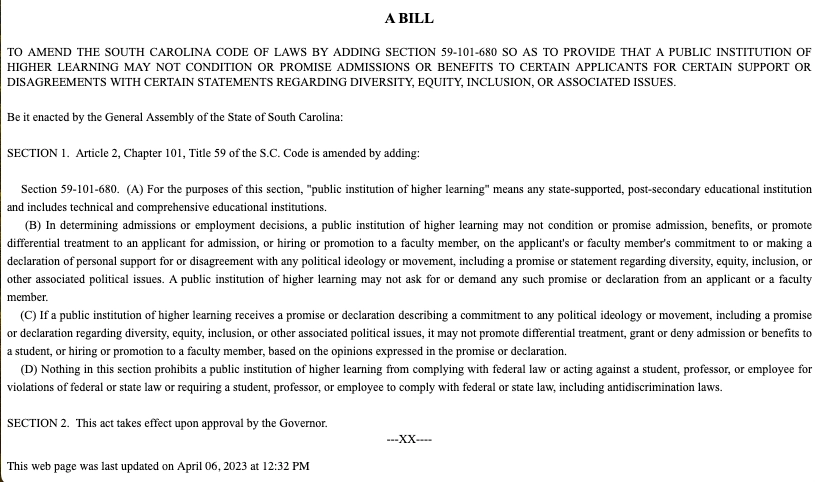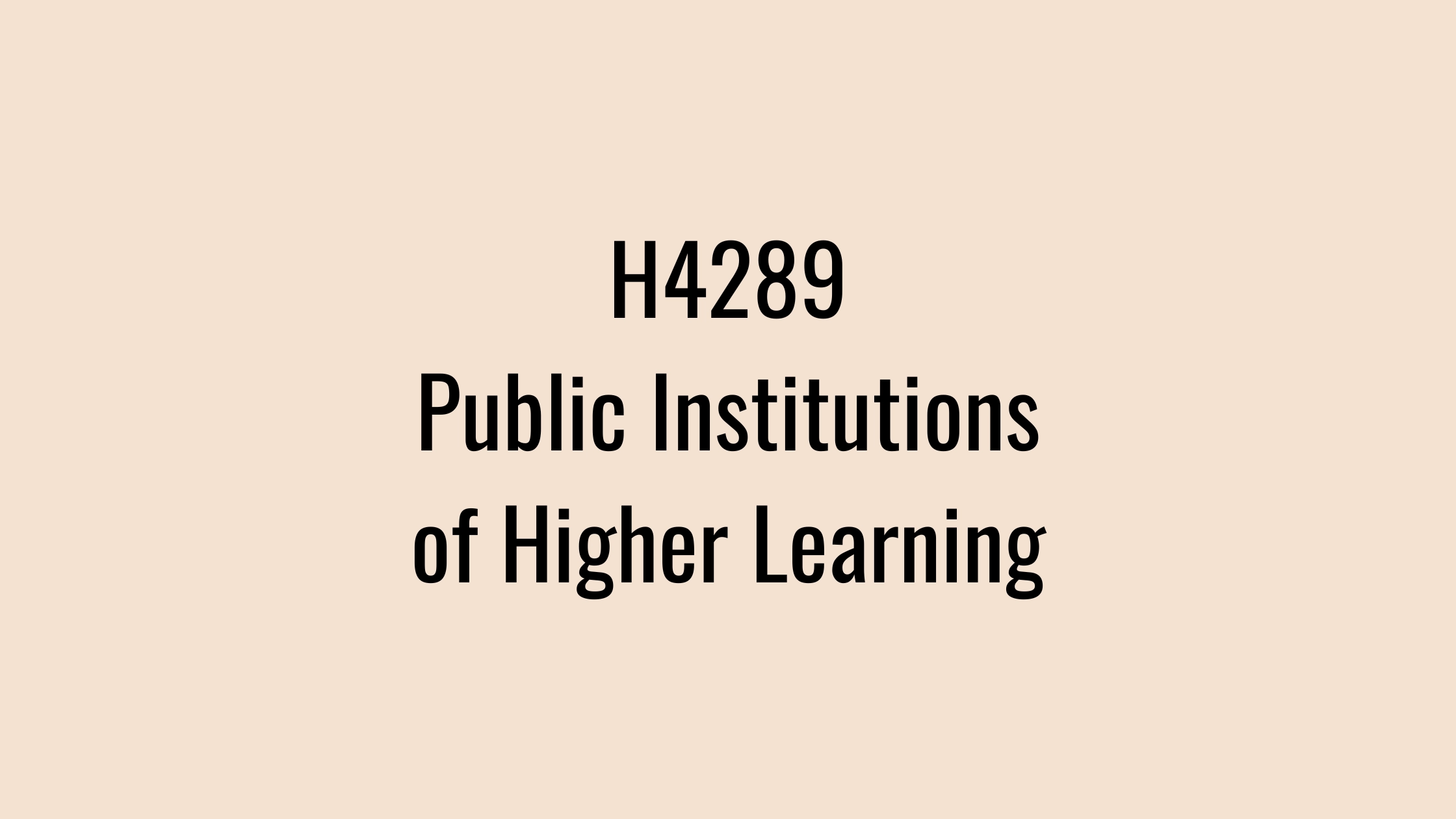H4289:
Once again, we're faced with yet another bill aiming to enact an unnecessary and ineffective law. Frankly, this bill could easily be labeled "Bill for Election Campaigning Purposes," as its only apparent purpose is to allow elected officials to declare, "We've fixed it!" (Only, in truth, nothing will be fixed.)
H4289, aimed at regulating the approach of South Carolina's public institutions of higher learning toward diversity, equity, and inclusion (DEI) initiatives, is riddled with fundamental issues that render it ineffectual at best and counterproductive at worst:
No Real Teeth
The bill is essentially toothless. Lacking a clear enforcement mechanism, it amounts to nothing more than words on paper. Institutions have no incentive to comply, nor do they face any repercussions for ignoring the bill's directives. It's a classic case of legislative oversight without the bite needed for enforcement.
Unnecessary Government Expansion
Here's another unnecessary attempt to impose yet another redundant law on higher education, further muddying the waters with rules that are anything but clear. Its ambiguous language and application create a bureaucratic maze, one that institutions will easily navigate around, inevitably leading to inconsistent application and interpretation. It's a law that will do more to dodge the very issue it purports to address than to solve it.
LOOPHOLE ALERT!
Oh dear! Did you see where it says that nothing in this law prohibits anyone from complying with federal anti-discrimination law? Well, that is actually one of the roots of this whole problem! And the loophole.

The requirement for compliance with federal guidelines turns this bill into an exercise in redundancy. Institutions are already bending over backwards to align with DEI standards, primarily because there's a hefty federal paycheck attached. It's like passing a law that requires people to breathe air. This bill's insistence on adherence to federal guidelines is akin to reminding fish about the importance of water.
Out of Touch with DEI Terms
Attempting to confine the ever-evolving DEI terms and concepts within a static legal framework is an exercise in futility and somewhat of a joke. This bill's efforts to address the nuanced and shifting landscape of DEI are so ineffective, it misses the mark so spectacularly that you might think it was aiming elsewhere. This approach ignores the DEI Leftist workarounds.
Ignoring the Root
The truth is, South Carolina's state colleges are not just familiar with DEI work; they're steeped in it. These principles are so deeply embedded in their educational strategies and campus cultures that attempting to dislodge them would be an exercise in futility. And let's be clear: this bill won't even scratch the surface, much less pull a weed from those well-established roots.
Verdict: Dead on Arrival
To put it bluntly, this bill should be dead on arrival. It wastes legislative time and taxpayer resources, offering no tangible benefits while posing significant drawbacks.
In summary:
South Carolinians, let's be unequivocally clear: this bill doesn't deserve your support. It's a legislative mirage, promising solutions but ultimately failing to deliver any substantive change to the issues it claims to tackle. Plus, the language concerning compliance with federal guidelines renders it completely ineffective. It's an exercise in futility, crafted more for the spectacle of action than any real impact. It will accomplish nothing towards addressing DEI leftist approaches. Supporting it would be akin to endorsing a placebo in place of genuine medicine—a waste of time, resources, and legislative energy. The blunt truth is, if passed, it will sit on the books as an entirely ineffective piece of legislation, leaving the issues it aims to fix just as entrenched and unresolved as they were before.
Committee Hearing 3/19/24
Full Education and Public Works Committee Hearing on 3/19/24: 1 hour upon adjournment of the House. Here is the agenda.
Fiscal Impact Statement
Update 4/6/24
The recent amendment to this bill has effectively neutered its potential impact, rendering it a toothless gesture rather than a meaningful legislative reform. Frankly, as it stands, this bill won't achieve anything close to its original intention. The absence of an enforcement mechanism is a glaring oversight; without it, there's no backbone to ensure compliance. The pervasive use of "may" throughout the text introduces a level of ambiguity or perceived leniency, suggesting discretion rather than obligation, which further dilutes its authority. Moreover, the lack of penalties for non-compliance means there's no deterrent against ignoring the bill's provisions.
Additionally, the language in section (D), which states that nothing in the section prohibits compliance with federal law or actions against individuals for violations of federal or state law, including anti-discrimination laws, is inherently contradictory to the bill's supposed goals. Considering that all South Carolina state colleges receive federal funding and are thus bound by federal regulations, which include mandates that directly conflict with this bill, the provision seems at best redundant and at worst, fundamentally at odds with the bill's purpose.
In essence, this bill, as amended, is set up to fail, offering little more than lip service to the issues it purports to address.

3/27/24: H4289 Amended Again & It Passed the House
Alright, let's cut through the noise about this amended version of H4289 that's supposedly putting the brakes on DEI (Diversity, Equity, and Inclusion) in colleges. Spoiler alert: it's not quite the game-changer it's made out to be. Here's the real deal, and why this bill, frankly, misses the mark.
First off, the enforcement mechanism is about as robust as a house of cards. Without clear penalties, a designated authority to crack the whip, or a straightforward process for handling violations, what we've got here is a bill that talks the talk but doesn't walk the walk. It's like saying you're going to enforce speed limits but then not bothering to install speed cameras or even put police on patrol. The result? Business as usual.
Now, onto the exemptions – and oh, aren't they a doozy. The bill practically bends over backward to ensure DEI can carry on under the guise of complying with federal laws, court orders, grant applications, and accreditation requirements. Let's be real: every public institution of higher learning is dancing to the tune of accreditation standards and federal laws, which are pretty cozy with DEI principles. These exemptions are so broad you could drive a truck through them. They ensure that as long as there's a federal law or accreditation standard that nods even slightly in the direction of DEI, colleges can keep on keeping on.
So, what's the bottom line? This bill is a lot of sound and fury signifying nothing. It's dressed up to look like a bold stance against DEI in higher education, but with its Swiss cheese enforcement and exemptions wide enough to render it toothless, it's essentially business as usual. If the goal was to genuinely curb DEI initiatives in colleges, then this bill is a swing and a miss. It's a classic case of political posturing that, when you read the fine print, doesn't deliver on its promises. In short, don't buy into the hype – this bill isn't the DEI game-changer it's cracked up to be.
SC Conservatives: we've got to slam the brakes on this trend of rubber-stamping weak laws that basically lay out the welcome mat for the LEFT to take over and drag things from bad to downright disastrous. Enough is enough.

Subscribe to ConservaTruth's Email Newsletter for curated insights on South Carolina's legislative activities and conservative viewpoints, delivered straight to your inbox! With vetted and easy-to-understand information, our newsletter empowers you to become an informed and engaged citizen, actively participating in safeguarding our cherished Constitutional values. Don’t miss out on crucial updates—join our community of informed conservatives today!





Comments